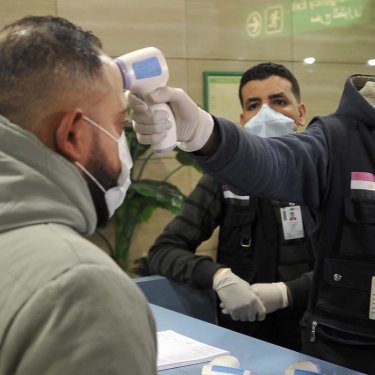Egypt withdraws British reporter’s press credentials for questioning official coronavirus figures

Reporters Without Borders (RSF) accuses the Egyptian authorities of reacting disproportionately and abusing their powers by withdrawing a Guardian reporter's press credentials and issuing a warning to a New York Times reporter for questioning the official figures for coronavirus cases in Egypt.
Guardian correspondent Ruth Michaelson’s press credentials were withdrawn on 16 March for allegedly quoting “exaggerated” estimates of the number of cases. In an article, she quoted Canadian medical researchers who said Egypt probably had more than 19,000 cases, about 15 times the official figure.
The State Information Service (SIS), the government agency that issues press accreditation, demanded a formal apology from the Guardian, saying in a statement that Michaelson’s story constituted a “violation of all the laws on journalistic work recognized in Egypt and internationally” and a “deliberate deception on a serious subject.”
Agence France-Presse quoted the Guardian as responding that Michaelson had simply reported the scientific findings of credible infectious disease specialists and had given the Egyptian authorities the opportunity to comment.
“This sanction is disproportionate,” said Sabrina Bennoui, the head of RSF’s Middle East desk. “By taking advantage of the coronavirus-related information crisis, the authorities are abusing their prerogatives and are trying to use their regulators, the State Information Service and the Supreme Council for Media Regulation, to control what journalists report.”
The SIS also said on 16 March that it had issued a warning to Declan Walsh, an Irish journalist who is the New York Times Cairo bureau chief, because of a tweet quoting the findings of the same Canadian specialists as those cited by Michaelson. Walsh subsequently deleted the tweet.
Egyptian reporters are also being prevented from covering the coronavirus epidemic properly. The Supreme Council for Media Regulation suspended news websites and webpages for six months for “spreading false news” and brought charges against their owners. It also published a hotline that can be called to report Internet content “liable to cause public anxiety.”
Last September, the Supreme Council for Media Regulation blocked the websites of the BBC and the US government-funded TV channel Alhurra for “publishing false information” about anti-government protests that were quickly stifled.
Egypt is ranked 163rd out of 180 countries in RSF’s 2019 World Press Freedom Index.



